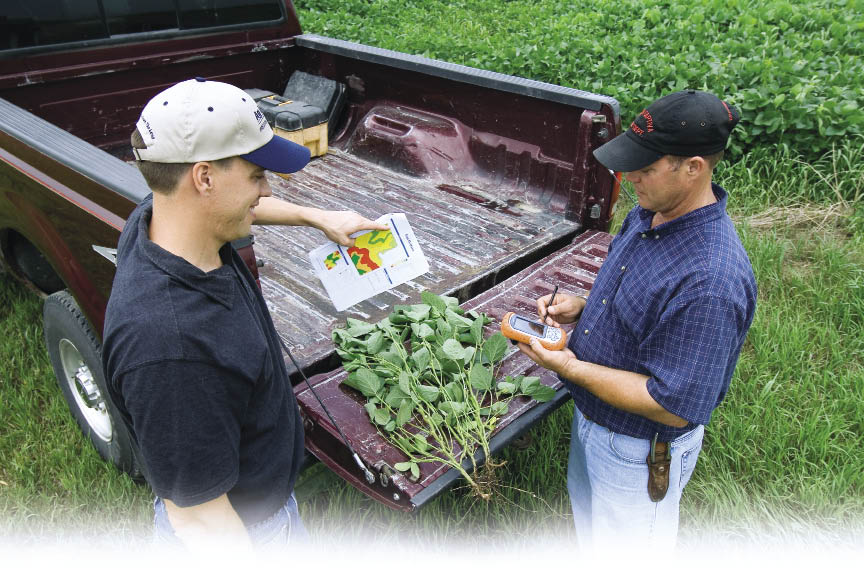Data management offers equipment dealers an opportunity to build on their farm technology business and create a new profit center.
(Editor's Note: This article appeared in the April/May 2013 issue of Farm Equipment magazine with the headline "Waking the 'Sleeping Giant' in Precision Farming." The article features interviews from the first-ever Dealership Minds Summit, which took place in late January 2013 in Kansas City, Mo.)
For many farm equipment dealers, the road to profitability with precision technology has been paved with auto-steer and GPS products which offer tangible paybacks to farm customers.
 The goal of farm equipment dealers looking to provide data management service is to become a part of their customers’ “inner circle” of trusted advisors, says Steve Cubbage. This can be done by leveraging dealers’ knowledge of precision farming technology to potentially become data “clearinghouses.” Photo courtesy of Ag Leader |
Few dealers have ventured into the realm of data management as a service offering, and for those who have, figuring out how to make money from it remains a challenge.
“Precision ag has taken off like wildfire — especially auto-steer — but why isn’t the data piece more important?” asks Steve Cubbage, owner of Record Harvest Enterprises Inc., a precision ag dealership in Nevada, Mo., and Prime Meridian, a precision ag data company. “The problem is there’s not an easy button for data. There’s an easy button for auto-steer; it’s called on or off. Press it at the end of the field and that’s it.”
Selling precision farming hardware and managing the information generated by this technology are two entirely different businesses.
But dealers are missing an opportunity to capitalize on data management as a potential revenue stream, notes Cubbage.
Farm Equipment’s 2007 Dealership of the Year owner shared his experience and advice on how equipment dealerships can break into data management at the first-ever Dealership Minds Summit, presented by Farm Equipment in Kansas City earlier this year.
“Precision farming is quickly moving beyond the hardware piece and we’re all struggling with that a little,” Cubbage says. “We need to treat this as a profit-making division in the company, rather than a loss-leader and start developing a service around that piece of hardware — from warranty service to making sure yield monitors are updated and have customers’ farms and fields loaded.”
Some Assembly Required
|
In the brief history of precision farming, one of the ongoing challenges shared by manufacturers, dealers and customers is finding a universal way to gather, sort and analyze information.
Cubbage likens the current landscape of precision data management to the “Tower of Babel” because nobody speaks the same language.
“It is absolute chaos. Everybody thought they could own the information and create their own standard,” he says. “The fact is this technology is moving fast. Nobody, even in consumer electronics, owns that part of the business.”
In precision farming, there is no industry standard when it comes to data management. This breeds confusion for both dealers and farmers, especially when it comes to unlocking the potential of data, says Cubbage.
Dealers are in a unique position, he says, to “take the bull by the horns” and leverage their knowledge of precision products to educate customers on the value of data.
“We’ve done a terrible job of educating growers and dealers, as far as what the possibilities of this technology can do and how to use it,” Cubbage says. “That needs to change and education is one of the first things that we as dealerships need to do. We need to understand that precision farming is more than just a piece of hardware; it is literally in some ways the future of the farming business if it’s done right.”
Cubbage is considered to be a pioneer when it comes to precision farming technologies and data management. When he formed Record Harvest in 1999, he says the goal was to have it be a data company. But he came to the realization that if he wanted to manage data for his customers, he needed to be able to sell and support the hardware that generated it. He spun Prime Meridian off from Record Harvest in 2007 to solely be a data management business for ag retailers and the farmers they serve.
“Nobody showed growers how to get data in and out of a monitor so it can benefit them at some point,” Cubbage says. “There’s some assembly required. But to me, it’s a simple service piece that could be included and promoted by dealers, because we should know the hardware better than anyone else.”
|
Jon Carlo, sales manager at A&M Green Power, gives his take on what he sees as the dealer's evolving role in providing data support. We caught up with Carlo following Steve Cubbage's presentation during the Dealership Minds Summit. |
Rather than just sell software or products to customers, dealers can sell services and provide a complete package, he says.
A common problem Cubbage encounters with customers is poor data collection methods, which result in worthless information — the old adage of “garbage in, garbage out.” Even though yield monitors have been around since 1992, growers still struggle with the basics of collecting data, Cubbage says.
“Twenty years later, we should be further down the road than this, and dealers have an important role to play because we have direct access to that equipment,” Cubbage says. “We understand the equipment and we have a relationship with the producer.”
The Trusted Advisor
But understanding the technology is only part of the equation for dealers who want to tap into data management. The goal should be to become part of a grower’s “inner circle” notes Cubbage.
However, this is easier said than done. “If they’re going to lead, the one thing iron dealers need to do is make precision a priority, not a subcategory within their business,” Cubbage says. “Ultimately, it’s going to drive all other pieces of your total business as a whole and gain the trust of your customers.”
First, dealers need to decide just what role they want to play for a customer when it comes to data management. They should be especially conscious of a customer’s seed and fertilizer dealer or co-op that is traditionally relied on for the agronomic aspects of data management.
“Some dealers have tried to recreate services that are typically rendered by seed dealers and co-ops and they, locally, step on some toes,” Cubbage says. “If you start making agronomic and fertilizer recommendations, and as an iron dealer you are also trying to sell the local co-op five new sprayers, that doesn’t set the right tone for a customer.”
So can dealers play the role of trusted advisor for a customer?
 Steve Cubbage tells attendees of the first Dealership Minds Summit that his approach to data management is to offer customers a “bundle” of services and set them on a long-term path with precision technology. |
Cubbage says to do so effectively, farm equipment dealers are wise to establish a separate part of their existing business — or create a totally independent business — that revolves around precision data service.
Whether dealers are actually making recommendations or not, data management centers around agronomy. Cubbage suggests either hiring or working with someone with a strong agronomic background.
“That’s what we’ve done internally with our business, because we now have shifted from the machine part, or what I call the technician part of precision ag, and now we’re morphing into how this affects my customers’ yield and their bottom line,” he says. “It all spins around agronomy.”
For dealerships just starting to explore data management service, an entry point could be as “precision traffic cops” or third-party advisors who work with customers to extract data and store it, rather than analyze it.
“Dealers can serve as that unbiased liaison between the precision players and readily assess local precision ag resources,” Cubbage says. “And then coordinate that comprehensive plan — maybe that 4-year plan of putting them on the path to moving to the next level in precision ag.”
This is the approach Cubbage took with Prime Meridian in establishing data “bundles” to plan for a customer’s future goals with precision farming.
|
“We don’t ask the grower if he wants to do soil sampling or yield mapping, we now sell that as an entire bundle,” he says. “None of this a la carte potpourri type of precision ag. This is where we’re looking to go and the grower appreciates that because he has a set cost per acre.”
Future Growth
As Cubbage notes, many growers don’t know what they want out of their precision data, and plotting a course for customers can result in long-term business for a dealership.
Developing a plan offers a variety of potential revenue opportunities for dealers to provide valuable services tied to data management — from off-season maintenance to data transfer.
“A lot of dealers have winter specials where they prep combines for the winter, and the same thing could be done on precision ag equipment as far as calibrating and making sure those yield monitors are prepped and ready for spring to go to the field,” Cubbage says. “There’s money in doing that and a reason to go back out to your growers on a regular basis.”
In the future, remote service may emerge giving dealers an opportunity to provide more “behind the scenes” offerings tied to data management like telematics for fleet management and field monitoring.
“The more we can wirelessly log on to a farm is going to be a better deal because technicians are tired of driving 2 hours each way to load a prescription from a USB stick that the grower was having problems with,” Cubbage says. “We need to be able to do that wirelessly and do that remotely and we’ll become much more efficient.”
The flip side of wireless technology is that data could become more scattered and harder for growers to keep track of, Cubbage says.
But dealers could position themselves as the “clearinghouse” for customers’ data and carve out a profitable niche in the precision farming industry.
“Farmers want a central safe deposit box and they need to be in some way controlling their data,” Cubbage says. “The question is, who’s going to step up in the industry to provide that and work with the manufacturers to realize that data needs to be controlled and shared and directed by the grower.”



![[Technology Corner] Helping Your Customers Determine Which Technology is Right for Them](https://www.precisionfarmingdealer.com/ext/resources/2025/03/26/Helping-Your-Customers-Determine-Which-Technology-is-Right-for-Them.png?height=290&t=1743084621&width=400)


